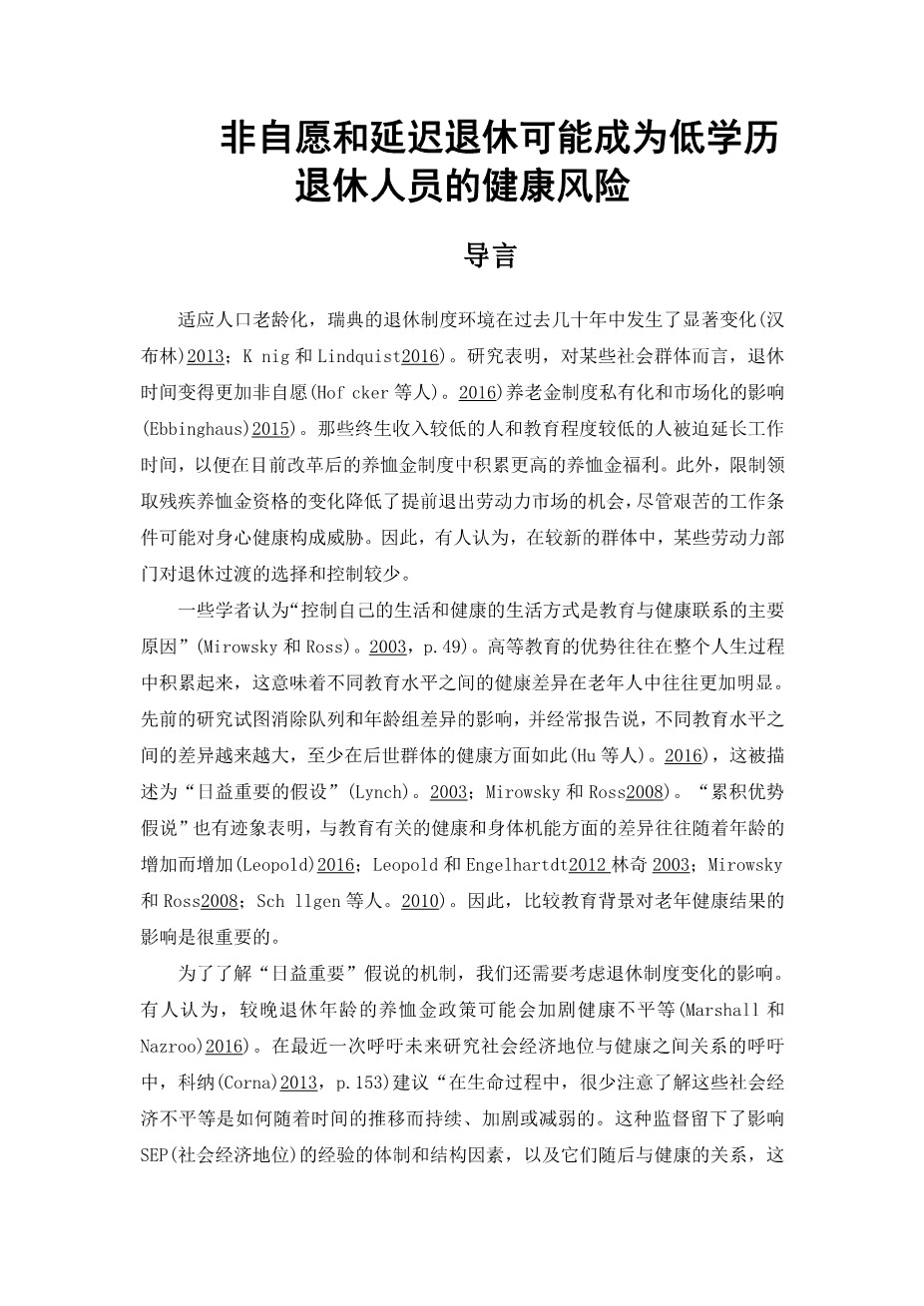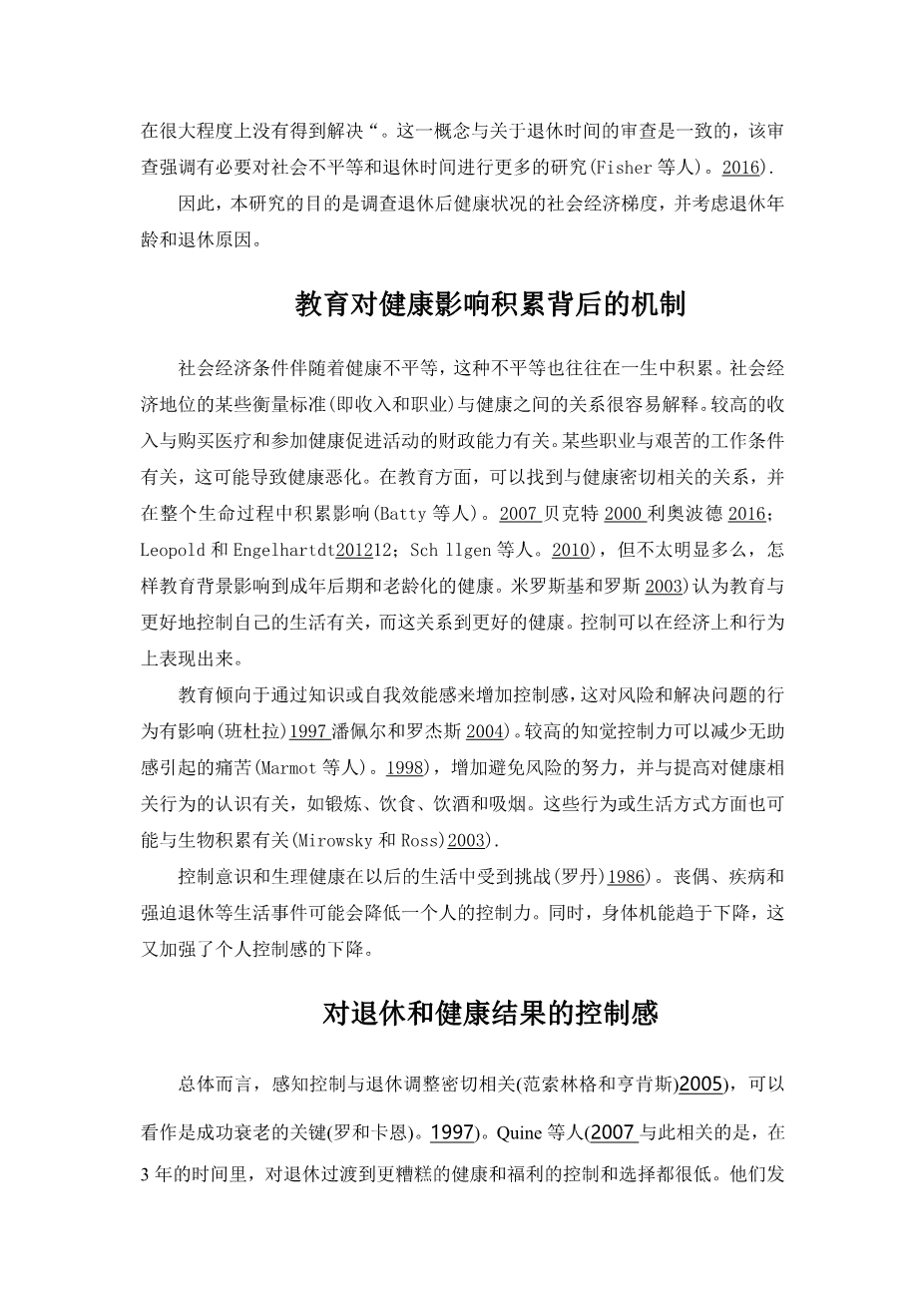Involuntary and Delayed Retirement as a Possible Health Risk for Lower Educated Retirees
Introduction
Adjusting to population ageing, the institutional context of retirement in Sweden has changed markedly throughout the last decades (Hamblin 2013; Kouml;nig and Lindquist 2016). Research suggests that the retirement timing has become more involuntary for certain social groups (Hofauml;cker et al. 2016) as an effect of the privatization and marketization of the pension system (Ebbinghaus 2015). Those with lower lifetime earnings and often those with lower education are forced to work longer to accumulate higher pension benefits in the current, reformed pension system. In addition, changes limiting the eligibility of disability pensions provide lower opportunities to exit the labour market earlier, despite strenuous working conditions which may pose a threat to physical and mental health. Hence, it is argued that certain work force segments, in more recent cohorts, have less choice and control over their retirement transition.
Some scholars argue that “control over onersquo;s own life and the healthy lifestyle that goes with that control account for most of the association between education and health” (Mirowsky and Ross 2003, p. 49). The advantages of higher education tend to accumulate over the life course which implies that health differences across educational levels tend to become more pronounced in older ages. Previous studies have tried to disentangle the effects of cohort and age group differences and often report rising differences across educational levels, at least with regard to health in later born cohorts (Hu et al. 2016), which has been described as the “rising importance hypothesis” (Lynch 2003; Mirowsky and Ross 2008). There are also indications for the “cumulative advantage hypothesis”, proposing that differences in health and physical functioning related to education tend to increase with age (Leopold 2016; Leopold and Engelhartdt 2012; Lynch 2003; Mirowsky and Ross 2008; Schouml;llgen et al. 2010). Comparisons of the effects of educational background for health outcomes in older ages are therefore important.
In order to understand the mechanisms of the rising importance hypothesis, we also need to consider the effects of changes in the retirement system. It has been suggested that pension policies for later retirement ages may exacerbate health inequalities (Marshall and Nazroo 2016). In a recent call for future research on the relationship between socio-economic status and health, Corna (2013, p. 153) suggests that “in the context of the life course, too little attention is devoted to understanding how these socioeconomic inequalities are sustained, exacerbated or attenuated over time. This oversight leaves the institutional and structural factors that shape the experiences that are consequential for SEP [socio-economic position], and their subsequent relationship with health, largely unaddressed”. This notion is in line with the review on retirement timing which emphasizes the need for more research on social inequalities and retirement timing (Fisher et al. 2016).
Therefore, the present study aims to investigate the socioeconomic gradient in post-retirement health outcomes taking retirement age and reasons for retirement into account.
Mechanisms Behind the Accumulating Effects of Education on Health
Socioeconomic conditions are accompanied with health inequalities, which also tend to accumulate over the life span. The relationship between some measures of socioeconomic status (i.e. income and occupation) and health are easy to explain. Higher income is related to the financial ability to buy medical care and to attend health promoting activities. Certain occupations are related to strenuous working conditions which can lead to worse health. When it comes to education, a strong relationship with health and accumulating effects over the life course can be found (Batty et al. 2007; Beckett 2000; Leopold 2016; Leopold and Engelhartdt 201212; Schouml;llgen et al. 2010), but it is less obvious how the educational background affects health in late adulthood and aging. Mirowsky and Ross (2003) argue that education is related to higher control o
全文共32549字,剩余内容已隐藏,支付完成后下载完整资料


英语译文共 18 页,剩余内容已隐藏,支付完成后下载完整资料
资料编号:[453429],资料为PDF文档或Word文档,PDF文档可免费转换为Word


